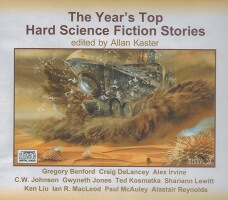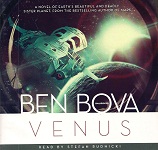
 The Year’s Top Hard Science Fiction Stories
The Year’s Top Hard Science Fiction Stories
Edited by Allan Kaster; Read by Tom Dheere, Nancy Linari, and Henrietta Meire
9.5 Hours – [UNABRIDGED]
Publisher: Infinivox
Published: 2017
Lately I’ve been craving good Hard Science Fiction tales. You know the kind… Stories in which the science plays a significant role in the plot. Stories in which the “science” in “science fiction” is more than just a setting.
My craving was satisfied by this terrific audio anthology edited by Allan Kaster and read by Tom Dheere, Nancy Linari, and Henrietta Meire. These stories, taken from those published in 2016 in various venues, use your imagination to ask real questions about our universe. The narrators are quite good, confidently throwing science around like they know what these characters are talking about.
I thoroughly enjoyed it and will be looking forward to next year’s anthology. This is my kind of science fiction.
CONTENTS:
Seven Birthdays by Ken Liu
Sixteen Questions for Kamala Chatterjee by Alastair Reynolds
Number Nine Moon by Alex Irvine
Chasing Ivory by Ted Kosmatka
Something Happened Here, But We’re Not Quite Sure What It Was by Paul McAuley
Of the Beast in the Belly by C.W. Johnson
RedKing by Craig DeLancey
Vortex by Gregory Benford
The Visitor from Taured by Ian R. MacLeod
The Seventh Gamer by Gwyneth Jones
Fieldwork by Shariann Lewitt
For those that like quick story synopses, here is Infinivox’s description of the anthology:
An unabridged audio collection spotlighting the “best of the best” hard science fiction stories published in 2016 by current and emerging masters of the genre, edited by Allan Kaster. In “Vortex,” by Gregory Benford, astronauts find a once thriving microbial lifeform that carpets the caves of Mars dying off. A code monkey tracks down the vain creator of a pernicious software virus that people jack cerebrally in “RedKing,” by Craig DeLancey. In “Number Nine Moon,” by Alex Irvine, illicit scavengers on Mars are on a rescue mission to save themselves after one of their team members dies. A young girl’s thirst for vengeance becomes a struggle for survival when she is swallowed by a gigantic sea creature on an alien planet in “Of the Beast in the Belly,” by C.W. Johnson. In “The Seventh Gamer,” by Gwyneth Jones, a writer immerses herself into a MMORPG community to search for characters being played by real aliens from other worlds. A woman armed with a rifle stalks a herd of cloned wooly mammoths in British Columbia in “Chasing Ivory,” by Ted Kosmatka. In “Fieldwork,” by Shariann Lewitt, a volcanologist struggles with her research on Europa where both her mother and grandmother suffered dire consequences. A daughter pays homage to her mother with mega-engineering projects to deal with climate change over eons in “Seven Birthdays,” by Ken Liu. In “The Visitor from Taured,” by Ian R. MacLeod, a cosmologist in the near future is obsessed with proving his theory of multiverses. The citizens of a small town on a “Jackaroo” planet object to a corporation placing a radio telescope near local alien artifacts in “Something Happened Here, But We’re Not Quite Sure What It Was,” by Paul McAuley. And finally, in “Sixteen Questions for Kamala Chatterjee,” by Alastair Reynolds, a graduate student defends her dissertation on a solar anomaly that threatens humanity.
My favorite stories in the collection were Ken Liu’s “Seven Birthdays” and “The Visitor from Taured” by Ian R. MacLeod. I enjoyed all of the stories, though.
Every one.
Posted by Scott D. Danielson
 The Telling (Hainish Cycle)
The Telling (Hainish Cycle)
